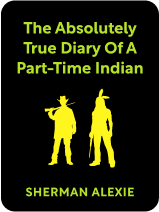

This article is an excerpt from the Shortform summary of "The Absolutely True Diary of a Part-Time Indian" by Sherman Alexie. Shortform has the world's best summaries of books you should be reading.
Like this article? Sign up for a free trial here .
What does escaping poverty mean? How does Junior begin the process of escaping poverty in The Absolutely True Diary of a Part-Time Indian?
In The Absolutely True Diary of a Part-Time Indian, Junior grows up in poverty on a Native American reservation. Poverty, and escaping poverty, are major themes of the book as Junior learns that he may be able to seek opportunities in the world.
Keep reading to find out more about Junior starts to believe in himself, and envision a life other than poverty.
Junior’s Life and Escaping Poverty
Junior’s mother is an avid reader and can recite entire pages of text verbatim. She dreamed of going to college and might have become a professor.
Junior’s dad dreamed of being a musician. He has an amazing voice and plays the guitar and piano. He still keeps a high-school saxophone that he takes out to shine every once in a while. For Junior, seeing his parents fail at escaping poverty is painful, and motivates him to take chances.
But no one believed in their dreams. Junior’s parents come from a long line of poor people, and like most of the other Indians on the reservation, they couldn’t escape the cycle of poverty. Both are alcoholics and suffer from depression. When Junior’s dad isn’t out drinking, he sits alone in his bedroom and watches basketball games on TV. But he doesn’t cheer or boo or react much at all to what he’s watching.
Despite their poverty and struggles with depression and alcoholism, Junior’s parents are devoted to their son and encourage him to pursue his dreams, as we’ll see.
Reardan: Escaping Poverty With Education
Junior says that most people think the worst thing about being poor is being hungry. He acknowledges that sometimes, he and his family go upwards of 18 hours without eating because they don’t have the money for food. But Junior always knows that eventually, one of his parents will come home with KFC. And KFC tastes even better when you’re hungry.
Junior sometimes wants to blame his parents for their poverty, but he knows he can’t. He knows his family’s poverty is not his parents’ fault, and he knows they dreamed of more. But no one on the reservation realizes their dreams. They don’t get the chance. They’re too poor. And that creates a cycle that’s makes escaping poverty extremely difficult.
- First, you believe you’re poor because you’re stupid.
- Then, you believe you’re stupid because you’re Indian.
- Finally, because you’re Indian, you believe you will always be poor, and the cycle repeats itself.
Poverty doesn’t make you strong or perseverant. Poverty just “teaches you how to be poor.”
Poverty on the Reservation
Junior’s family doesn’t have money for presents at Christmas, so his father does what he always does when there isn’t enough money for something: He takes what they do have and gets drunk. He’s gone from Christmas Eve until January 2nd.
When he gets back, he’s so hungover that he can’t get out of bed. Junior goes into his room to say hello, and his dad apologizes about there being no presents at Christmas. Junior tells him it’s okay, but it isn’t. He realizes that he’s once again trying to protect the man who repeatedly breaks his heart.
Junior’s dad tells Junior that he has a present for him now, which he’s been storing in his boot. Under the foot pad, Junior finds a wrinkled five dollar bill. He can’t believe that his father was able to keep himself from spending his last $5 on a bottle of whiskey and two more days of drunken bliss. Junior turns to thank his father for saving the money for him, but his father has already fallen back asleep.
Since being at Reardan, Junior has come to understand what good parents he has. Yes, his dad is an alcoholic and his mom is an “ex-drunk,” but they show how much they care about Junior with the sacrifices they make and the way they talk to him honestly and listen to him sincerely. This is more than many of Junior’s white peers can say. Junior notices that the parents, especially the fathers, of many of his classmates ignore their kids.
Conversely, on the rez, everyone knows everyone else. There might be problems on the rez, but everyone is close. It’s like a big family.
Junior cries thinking about how amazing his sister was. She pursued her dreams. She never reached them, but it was the bravery of the attempt that mattered. Junior sees that, like his sister, he’s also making the attempt, and it also might kill him, but staying on the rez also would have killed him. Escaping poverty can be deadly, but so is staying where he is.

———End of Preview———
Like what you just read? Read the rest of the world's best summary of Sherman Alexie's "The Absolutely True Diary of a Part-Time Indian" at Shortform .
Here's what you'll find in our full The Absolutely True Diary of a Part-Time Indian summary :
- How Junior gets split between two worlds when he goes to a mostly white school
- How Junior overcomes being an outsider to being part of welcoming social circles
- The tragedies of alcoholism and poverty that leave Junior with renewed strength






